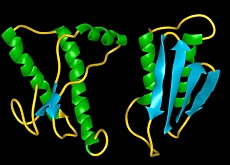Prions play key role in long-term memory

Scientists at the University of Zurich have proved that a prion protein gene plays a key role in human long-term memory.
Proteinaceous infectious particles – prions – have up to now always been connected with mad cow disease and its human equivalent, Creutzfeldt-Jakob Disease.
“Nature did not invent this gene so that we get BSE!” Andreas Papassotiropoulos, head of the clinical genetics research group at Zurich University Department of Psychiatry Research, told swissinfo.
“It has to play a meaningful role, and this role has not been clear up to now. These findings are the first to demonstrate that this gene in fact enables the formation of long-term memory in humans.”
Nobel Prize winner Eric Kandel, one of the pioneers of the study of memory at the molecular level, had already found a connection between prion-like structures and long-term memory in snails.
But, according to Dominique de Quervain, head of the memory research group at the Department of Psychiatry Research, while genetic variations have been shown to affect short-term memory in humans, their effects on long-term memory have remained unknown.
Kandel’s previous work demonstrated that long-term memory is the result of new proteins being made at the synaptic connections between nerve cells.
Now Papassotiropoulos and de Quervain at Zurich have shown that the same mechanism plays a central role in human long-term memory.
First step
Papassotiropoulos admits they were inspired by Kandel’s work.
“We tested individuals for several different memory types – immediate, short-term and 24-hour delayed recall [long-term],” says Papassotiropoulos.
“And supporting the hypothesis of Kandel that this prion-like conformation affects specifically long-term memory, we saw that our individuals with different prion gene variants had differences in their long-term memory.”
Papassotiropoulos explains that this is the very first gene which has been identified to be associated with long-term human memory.
“It’s a first step, but a crucial one, towards understanding human memory and being able later to treat people with memory disturbances. We know how memory works in mice, but we really don’t know how it works in humans,” he says.
Wordlist
Scientists have known for a while that human cognitive processes – how we think and gain empirical knowledge – vary wildly from person to person and are influenced by both nature and nurture: by our genes and our environment.
In order for information to cross successfully from short-term to long-term memory, it seems the connections between nerve cells have to be stable.
The researchers in Zurich demonstrated that this process is supported by the prion gene, which in healthy humans comes in two variants – 129-Met and 129Val.
Twenty-four hours after 349 subjects had been given a wordlist learning task, carriers of the 129Met variant recalled 17 per cent more information than 129Val carriers. Short-term memory was unaffected.
These results suggest a role for the prion protein in the formation of long-term memory in humans.
The results of the study are available on the online edition of the English science journal Human Molecular Genetics. They will be published in print in August.
Long-term research
The researchers acknowledge that they are far from coming up with concrete, practicable results.
“This is very long-term [research],” says Papassotiropoulos. “Until now no one really knew which genes participated in the formation of human memory. And you have to understand how it works so that you can fix it if it’s not working any more.”
And he stresses that people with good memories shouldn’t get anxious and try to start forgetting. “What we have found by no means indicates that people who are able to remember well will get BSE or Creutzfeldt-Jakob.”
As for the future, Papassotiropoulos says there are two further steps. “The first is to identify more genes to really know how [long-term memory] works,” he says.
“The second is: when we have found those genes we can look with brain imaging dyes to localise the precise region where the gene is acting.”
swissinfo
Scientists at the University of Zurich have identified the very first gene, a prion protein, to be associated with long-term human memory.
The results came after testing individuals with different prion gene variants on immediate, short-term and 24-hour recall (long-term).
Previously, such a connection had only been found in snails.

In compliance with the JTI standards
More: SWI swissinfo.ch certified by the Journalism Trust Initiative


You can find an overview of ongoing debates with our journalists here. Please join us!
If you want to start a conversation about a topic raised in this article or want to report factual errors, email us at english@swissinfo.ch.